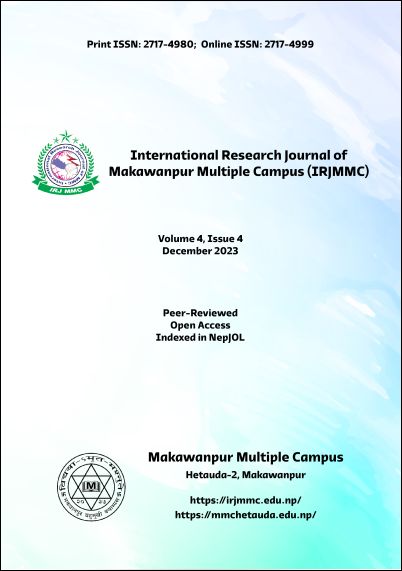वात्सायनको कामसूत्रमा साहित्य विश्लेषणको सैद्धान्तिक आधार (The Theoretical Basis of Literature Analysis in Vatsayan's Kamasutra)
DOI:
https://doi.org/10.3126/irjmmc.v4i4.61160Keywords:
काम, मन, विभाव, व्यभिचारीभाव, फ्रायडवाद, Sex, Mind, Emotion, Adultery, FreudianismAbstract
प्रस्तुत अनुसन्धानमूलक लेखमा वात्सायनको कामसूत्रको अध्ययन गरी यसबाट साहित्य विश्लेषणको आधार खोजी गरिएको छ । वात्सायनको कामसूत्र विश्व साहित्यमा नै प्राचीनतम एवम् व्यवस्थित यौनविषयसँग सम्बन्धित पुस्तक हो । तर यसलाई कामविज्ञानका रुपमा मात्र अध्ययन भइरहेको पृष्ठभूमिमा यस लेखमा साहित्यिक मूल्यको खाजी गरिएको छ । सम्भोकलासँग सम्बन्धित कामसूत्रमा शृङ्गार रस र यसका सामग्रीहरु (विभाव, अनुभनव, व्यभिचारीभाव र स्थायीभाव) का बारेमा व्यापक र व्यवस्थित चर्चा भएको छ । त्यसैगरी त्रिवर्ग (धर्म, अर्थ र काम) अन्तर्गत कामका बारे विस्तृत रुपमा विश्लेषण गर्दै काम र मनका बीचको नजिकको सम्बन्ध अनि मनको आनन्दको प्रमुख स्रोत काम वा सम्भोगसुख विषय कामसूत्रमा उल्लेख भएको छ । यस लेखमा कामसूत्रमा रहेको शृङ्गारिकता एवम् काम र मनको सम्बन्धलाई साहित्य विश्लेषणको सैद्धान्तिक आधारका रुपमा पहिचान गरिएको छ ।
[In the presented research article, Vatsayana's Kamasutra has been studied and the basis of literary analysis has been sought from it. Vatsayana's Kamasutra is the oldest and systematic book related to sex in world literature. But in the background that it is being studied only as a work science, the literary value has been checked in this article. In the Kamasutra related to Sambhogkala, there has been a comprehensive and systematic discussion about Sringara Rasa and its ingredients (vibhava, anubhanava, vyabhicharibhava and permanentbhava). In the same way, the close relationship between work and the mind and the main source of happiness of the mind is mentioned in the Kamasutra by analyzing work in detail under the three categories (religion, artha and sex). In this article, the beauty and the relationship between work and mind in the Kamasutra have been identified as the theoretical basis of literary analysis.]
Downloads
Downloads
Published
How to Cite
Issue
Section
License
Copyright (c) 2023 Ghanshyam Ghimire, Khil Prasad Baral, Nira Sharma, Jayram Gautam

This work is licensed under a Creative Commons Attribution-NonCommercial 4.0 International License.
This license enables reusers to distribute, remix, adapt, and build upon the material in any medium or format for noncommercial purposes only, and only so long as attribution is given to the creator.

